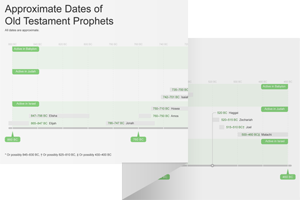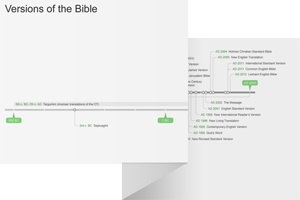1:1 This verse acts as a title or heading to the book of Malachi, |
An oracle See note on Nah 1:1.
 Prophetic Commissioning and the Divine Presence
Prophetic Commissioning and the Divine Presence
to Israel The remnant of people who returned from exile in Babylon. This title is used because Israel serves as another name for the people’s forefather Jacob (Gen 35:10), whose election is described in the verses following his naming.
Malachi Meaning “my messenger.” Possibly a descriptive title of the author rather than a personal name.
1:2–5 Malachi is written in a disputation style, much like the record of a court case. The pattern is used to raise a point made by certain individuals, and then offer a contradiction in a point-counterpoint formula. There are six cycles of disputation in Malachi. Each cycle begins with Yahweh making a statement of truth concerning His character. A hypothetical audience then offers a rebuttal in the form of a question. Each cycle ends with Yahweh responding by presenting supporting evidence. Other examples of the disputation pattern include Isa 40:27–28; Jer 2:23–37; Ezek 12:21–28; and Mic 2:6–11. |
1:2 I have loved you This Hebrew term for love is a technical term in ancient Near Eastern treaty and covenant texts indicating choice or election to covenant relationship. Here, the term speaks of Yahweh’s confirmation of His covenant with Abraham to Jacob rather than Esau (see Gen 28:13–15; 35:9–12). Normally, the oldest son would have been favored.
Esau The son of Isaac and older brother of Jacob (see Gen 25:21–26). Esau’s descendants were the inhabitants of Edom,
of Isaac and older brother of Jacob (see Gen 25:21–26). Esau’s descendants were the inhabitants of Edom, the region to the southeast of Judah on the southeastern corner of the Dead Sea. The area is arid and mountainous. Edom was perennially in conflict with Israel and Judah. This discordant relationship begins with the sibling rivalry between Esau and Jacob, the forefather of Judah. See Romans 9:13 and note.
the region to the southeast of Judah on the southeastern corner of the Dead Sea. The area is arid and mountainous. Edom was perennially in conflict with Israel and Judah. This discordant relationship begins with the sibling rivalry between Esau and Jacob, the forefather of Judah. See Romans 9:13 and note.
Jacob The son of Isaac and younger brother of Esau (see Gen 25:21–26).
of Isaac and younger brother of Esau (see Gen 25:21–26).
1:3 Esau I have hated The term for hate is an ancient Near Eastern covenant term. It is used here to denote rejection. Yahweh chose Jacob, not Esau, to continue the covenant relationship began with Abraham. This choice reflects a regular pattern in the ot where a younger son is favored (e.g., Abel in Gen 4, Isaac in Gen 21, Joseph in Gen 37, and David in 1 Sam 16). This recurring theme reveals that Yahweh is not bound by the conventions of human society. He is not obligated to choose someone just because of the priority of their birth.
I have made his mountain ranges a desolation The destruction described here is probably what resulted from the repeated invasions of Edom by the Babylonians between 605 and 540 bc. There is no evidence that Edom was invaded or destroyed during Nebuchadnezzar’s campaign against Judah around 586 bc. However, Nabonidus, one of Nebuchadnezzar’s later successors, claims to have destroyed a place that was probably the Edomite capital city of Bozrah around 552 bc.
the jackals of the desert A canine similar to but smaller than a wolf. These nocturnal scavengers howl with an eerie wail. See note on Lam 4:3.
1:4 I will tear down Yahweh will frustrate all of the Edomites’ attempts to reassert themselves as a regional power. This detailed picture of Yahweh’s attitude toward Edom appears to represent a counterexample to His attitude toward Judah.
1:5 beyond the borders of Israel The territory of Edom is located outside the land given to Israel by Yahweh.
1:6–2:9 Yahweh rebukes the priests for their failure to maintain the temple service with proper honor and respect. The people should show honor toward God as a son would honor his father, but Israel shows dishonor through their indifference, carelessness, and deception with regard to bringing sacrifices and offerings (Mal 1:6–9). No sacrifice at all would have been better than their polluted offerings (v. 10). The priests were allowing animals with physical defects to be offered as sacrifices even though biblical law stipulated only unblemished animals were appropriate for sacrifice (see Lev 1:3 and note). The priests do not even appear to recognize the seriousness of this violation (Mal 1:13). The priests above all should realize their responsibility to carry out their duties in a way that brings honor to Yahweh. Their failure brings judgment, and they will be held to account for causing the people to stumble (2:1–9). |
1:6 A son honors his father The term kavod connotes “honor,” “glory,” or “majesty,” and is often used as an attribute of God (see Exod 33:18; Isa 3:8).
his master The Hebrew word used here, adon, is the root word of Adonai, a title for God meaning “my master.”
Yahweh of hosts This divine title is used throughout this section (see Mal 1:8, 9, 10, 11, 13, 14; 2:2, 4, 7, 8). The descriptive term “hosts” refers to the heavenly beings, including angels, cherubim, and seraphim. The title asserts Yahweh’s role as commander-in-chief of the heavenly armies.
O priests The second disputation is specifically addressed to the priests. The priests were the descendants of Aaron who served in the temple.
of Aaron who served in the temple.
my name See vv. 11, 14; 2:2, 5. The priests’ disobedience was causing harm to Yahweh’s reputation.
1:7 You are presenting defiled food The priests were responsible for offering sacrifices to Yahweh using animals of the highest quality.
the table of Yahweh Refers to the sacrificial altar in the rebuilt temple (see Ezra 3:1–3)
is despised What should be held in respect is despised and treated with contempt (compare Num 15:31).
1:8 the lame and the one who is ill The law prohibited the use of imperfect animals for offerings to Yahweh (see Deut 15:21). The priests are being reprimanded for their lax attention to proper sacrificial practices.
your governor The political leader in Judah who was appointed by the Persian king. The Hebrew term appears most frequently in post-exilic books (Hag 2:21; Ezra 8:36; Neh 2:7; Esther 3:12), often with reference to officials appointed by the Persians.
Will he show you favor Hebrew uses the idiom of lifting the face (nasa panim) to describe showing favor to someone. The idiom likely developed from the act of responding to someone bowing in humility or shame by raising their downcast face to look them in the eye.
1:10 will shut the temple doors It would be better to close the gates of the temple so that the priests could no longer offer unclean sacrifices.
1:11 incense One of the regular duties of the priests was keeping the incense altar burning continually in the holy place of the temple (Exod 30:1–8; 2 Chr 13:11).
altar burning continually in the holy place of the temple (Exod 30:1–8; 2 Chr 13:11).
1:12 is defiled The phrasing echoes Mal 1:7 and reiterates the priests’ lax attitude toward their responsibilities. The priests are strangely unconcerned that their actions are desecrating Yahweh’s altar.
1:13 a weariness The priests viewed the sacrificial system as an oppressive burden, especially in light of the fact that the remnant—the small community of Jews who had returned from exile—was in a state of extreme poverty.
1:14 is the one who cheats Promising one thing and offering another amounts to cheating Yahweh out of what was rightfully His.
in his flock a male An unblemished male animal was required for certain vow offerings (see Lev 3).
a great king This title is full of covenantal implications; it was commonly used in ancient Near Eastern treaty texts to identify the suzerain (or high king) that others pledge loyalty to (compare Psa 47:2).
my name is awesome Evokes the image of the Divine Warrior whose reputation should strike fear into all who hear of Him (compare Josh 2:8–11; Psa 76:12).
whose reputation should strike fear into all who hear of Him (compare Josh 2:8–11; Psa 76:12).

|
About Faithlife Study BibleFaithlife Study Bible (FSB) is your guide to the ancient world of the Old and New Testaments, with study notes and articles that draw from a wide range of academic research. FSB helps you learn how to think about interpretation methods and issues so that you can gain a deeper understanding of the text. |
| Copyright |
Copyright 2012 Logos Bible Software. |
| Support Info | fsb |
 Loading…
Loading…




